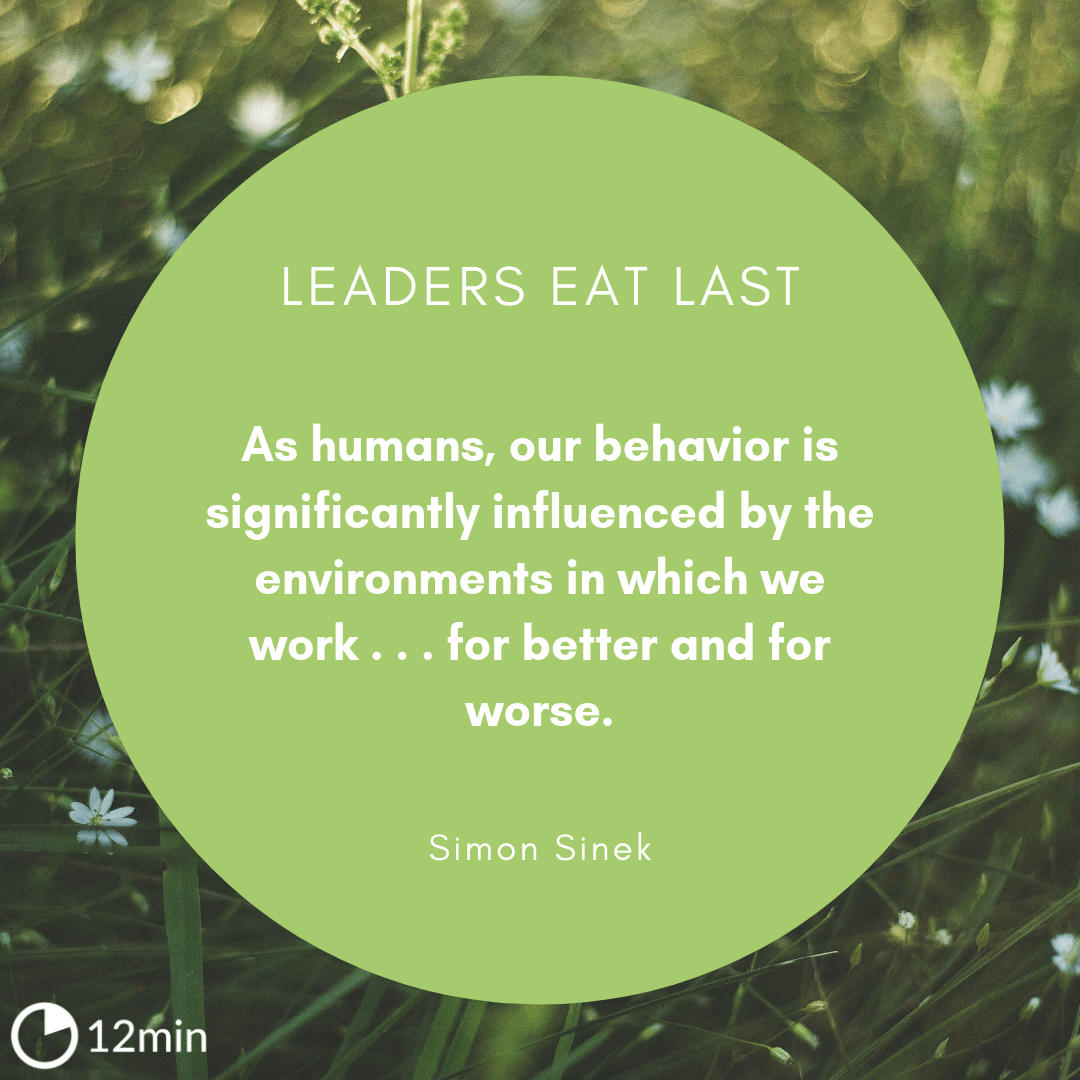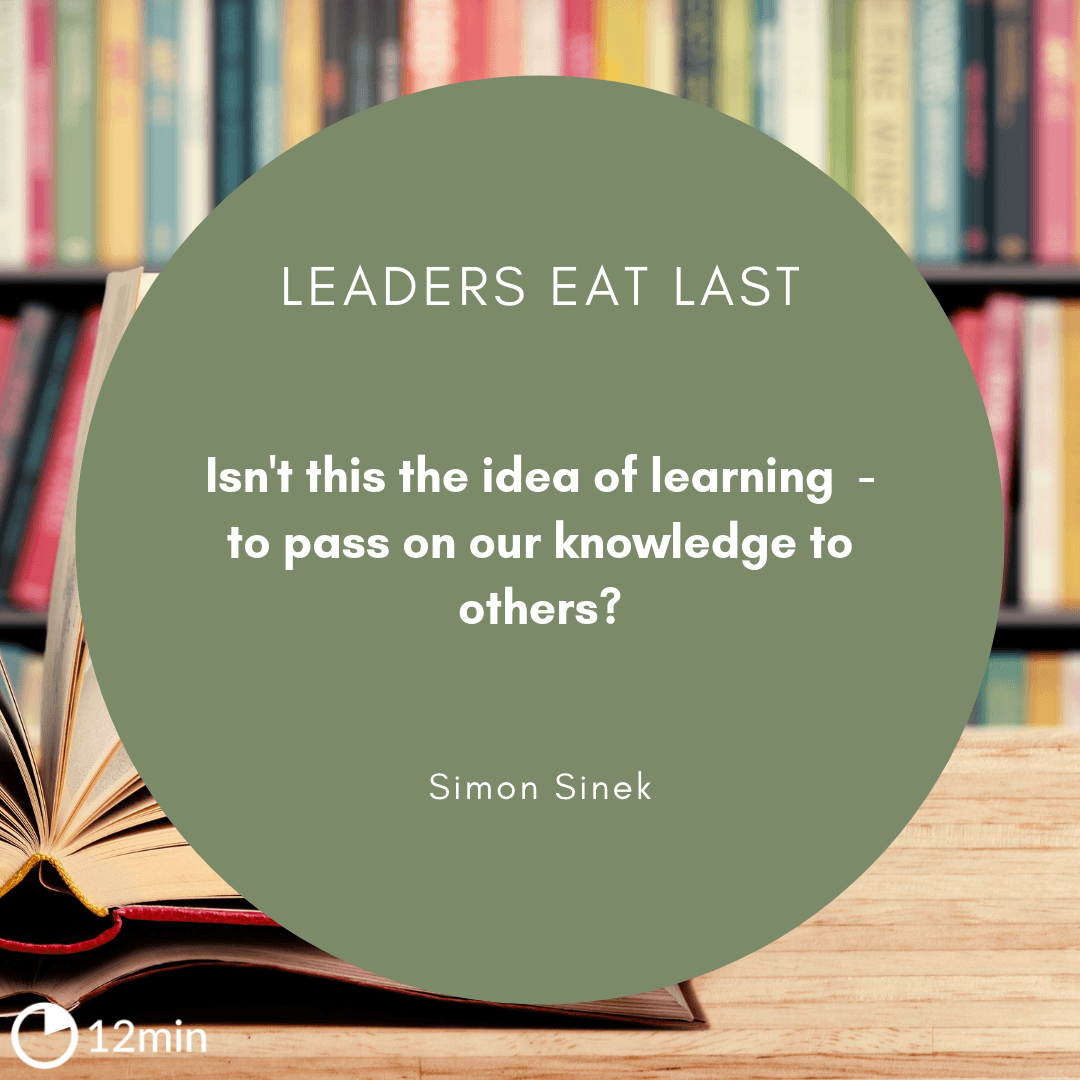Leaders Eat Last Summary
12 min read ⌚
Why Some Teams Pull Together and Others Don’t
When it comes to creating a successful business, everyone has a part to play. Are you an employee? What’s your level of engagement? Do you believe in the company’s mission? Are you leading a team or even an organization? What are you? A leader or a boss? Simon Sinek’s Leaders Eat Last explains why the values of a company’s leader can make or break it.
Simon Sinek is one of those authors who seek to unravel the reason why some people love their job whereas others don’t. And he believes it’s all thanks to the leader.
LEADER OF TRUST / LEADERS EAT LAST
Every successful company that exists today has a Circle of Safety which is led by a true leader, in which everybody trusts.
“Leaders Eat Last Summary”
Some will define Sinek as an incurable optimist. He turned his positive attitude into a real job, writing books and teaching leaders and organizations how to inspire people.
Why do so few people say “I love my job!”? For many people, to like what you do is almost like winning the lottery. Few have a chance to be truly valued for their work and feel part of something bigger.
That is because today’s leaders do not understand how people seek purpose in their work. Ever wanted to become a leader and did not know where to start? If the answer is yes, the “Leaders Eat Last” book by Simon Sinek is a full plate for you (pardon the pun).
In it, Sinek explores themes such as the origin of the hierarchy, its role in our contemporary society, and how to become a truly admired leader. Let’s go together on this journey to understand what motivates people and create a better work environment? Stick with us!
Leaders Eat Last provides many examples of teams built on the principles of trust and safety, with a clear and distinct Circle of Safety within the group, which seem to thrive, whereas others don’t.
Simon Sinek has some particular views on leadership, trust, work, and integrity, which seem to be related.
“Leadership is about integrity, honesty, and accountability. All components of trust”.
A true leader is capable of creating a Circle of Safety in which everyone feels safe. As long as members feel safe within the group, and don’t sense threats within it, they’ll invest all their time and energy to help their leader accomplish his desired goal. And they’ll do this because they know their leader has their back.
“All we need are leaders to give us a good reason to commit ourselves to each other.”
“When trust and cooperation thrive internally, we pull together and the organization grows stronger as a result”
What’ll be the result of trust? Sinek explains that once trust is gained within a group they’ll be able to work together, as they have a common goal.
What I loved the most about this book is that it goes far beyond just theories.
What is the real message of Simon Sinek’s book? What does the phrase Leaders Eat Last in fact mean? It indicates that the leader has the final word. In other words, if you want to become a leader, you should be aware that leaders must take care of those they lead.
The leadership role has a heavy burden, so think once again – are you able to manage this massive responsibility.
YOUR BIOLOGY ASKS YOU TO LEAD OR BE LED.
Our biology has evolved over thousands of years to help us survive. From our ancestors, our hormones control our emotions and our behavior. There are 4 main hormones you need to understand:
- Endorphin: The hormone that masks pain;
- Dopamine: The hormone that helps us accomplish things;
- Serotonin: The Leadership Hormone;
- Oxytocin: The love hormone;
Simon calls the first two (endorphin and dopamine) selfish hormones and the last two (serotonin and oxytocin) altruistic hormones. An interesting example cited by Sinek is dopamine. It rewards us with intense happiness every time we complete a task.
Are you happy when you clear your inbox? When do you complete a race? Yes, it’s the dopamine effect. Other hormones, such as serotonin and oxytocin, affect our social lives, helping us to relate to others.
But the endorphins disguise exhaustion and physical pain and can fool us mentally so that we can go further, even after significant physical efforts. Do you know when you finish an exercise feeling good, and the next day the whole body hurts?
It did not hurt right away because of the released endorphin, which increased its performance. Endorphins have risen to help prehistoric man hunt, even if tired, and thus bring food for his tribe.
Why?
This same hormone makes you, in sports, go much further than you imagined you could. Hormone-driven behaviors have created the model of our social hierarchy. In the example of the prehistoric man, the individuals who brought more food to their tribes took the leading positions in the group.
Weak individuals, the worst hunters, on the other hand, were relegated to supporting roles in the group. If hormones such as endorphin and dopamine have developed the aptest individuals to lead, hormones such as oxytocin are more present in the weaker.
They naturally tend to have a deeper sense of respect, admiration, and devotion to leaders. Together, the four shape our behaviors. So selfish hormones help us accomplish things, and altruistic hormones help us relate and better collaborate with others.
Empathy is a vital attribute because we the world need it – especially these days. Every organization, business, and company requires a strong leader. As “Alexander the Great” once said – I am not afraid of an army of lions led by a sheep.”
Even he indicates the value of proper leadership capabilities. Being a boss and being a leader are two different things. 12min team cites leaders and shares their thoughts with the world. This book summary protects from above, above means – backed by Simon and his work-hard approach.
Where do you want to work? It is not about the location or profession, is about the environment. Who doesn’t wish to be a part of a well-educated environment, where you can sense the atmosphere of support and enthusiasm among the co-workers.
EMPATHY, THE KEY TO LEADERSHIP
To lead effectively, it is essential that you be able to care for your followers and want them to be always well. You have to have a sense of responsibility towards them. Our sense of responsibility comes from empathy, from our ability to put ourselves in someone else’s shoes.
Without empathy, we distance ourselves from our leaders and can make decisions that harm them, especially if we become our most abstract relationship.
When this abstraction happens, we begin to prioritize our own interests to the detriment of others which can lead us to make decisions at their expense and thus hurt the culture of the organization. Being part of a group gives us a sense of security and the opportunity to evolve as people.
In the same way, feeling alone and threatened ends up becoming selfish and makes us lose our empathy. The further we are from our own, the more we are prone to dehumanize people and see them as gears of a machine.
It is always right to treat them as individuals who live, breathe, think, and have their needs, never letting this mechanization occur.
When people know that their leaders are concerned about protecting them, they can work harder and more focused, without worrying about external threats. Treat your employees with respect and dignity, and you will see results in every dimension of your life and your business.

Sinek provides real lessons of leadership, using day-to-day examples of either the success or failure of different companies. There are many things to learn from the cases he presents in his book.f
One important thing to take away from Leaders Eat Last is that the success of a company depends on its culture. If the employees are happy and feel safe at work, they’ll succeed at their job and the company will strive. It makes sense.
Another important point Sinek makes is related to performance.
The performance of a company is closely tied to the personality and values of the person at the top.
It goes without saying that the leader is essential within a company. And if that leader starts paying attention to his employees and treats them as people, not as mere subordinates, they’ll start to trust each other.
All this may help us think about our behavior at work.
So if the people we work with every day display a healthy attitude towards work and towards everyone in the team, we’ll treat them the same way. It’s the job of the leader to decide which behaviors are accepted and which are not.
As gatekeepers, leaders establish the standards of entry.
Leaders Eat Last also helps us think about the concept of responsibility. What’s a leader’s responsibility? Is it important to know his responsibilities? It must be because his team members will follow him as long as he upholds his responsibilities towards them.
The responsibility of leaders is to teach their people the rules, train them to gain competency and build their confidence.
Do you know the main responsibilities of a leader towards his people?
This leads us to my favorite quote from Sinek’s book:
Eating Last Is Repaid with Loyalty and Hard Work.
A true leader shows his care towards his team by acknowledging their importance. As the officers eat last, so must all leaders.
Leaders Eat Last is divided into 8 parts. The journey starts off quite general (“Our Need to Feel Safe”, “Powerful Forces”, “Reality”, “How We got There”) and then goes much deeper (“The Abstract Challenge”, “Destructive Abundance”, “Society of Addicts”, “Becoming a Leader”) .

These 8 parts describe the path a true leader must take in order to ensure the trust and loyalty of his people. Once a leader’s gained their trust and created a safe environment where everyone feels like they belong, he guarantees his success as a leader and the high performance of the unit he runs – be it a company, or a sports team.
Sinek also talks about 5 leadership lessons that need to be followed:
- 1: So goes the culture, so goes the company. The success of a company depends on the culture.
- 2: So goes the leader, so goes the culture. The leader is the one who influences the company’s culture, be it in a positive or negative way.
- 3: Integrity matters. As long as leaders adhere to a set of values for the company, its members will do the same.
- 4: Friends matter. They are an important part of our lives.
- 5: Lead the people, not the numbers. Leaders should care about leading their people, not the number that these people may represent.
Any leader who takes into account these leadership lessons and creates a Circle of Safety within the company will be successful.
All these lessons from Leaders Eat Last make us more aware of the work environments that exist today. The culture that’s encouraged, and the values that a leader should embrace.

AUTONOMY IN THE WORK ENVIRONMENT
People need control and autonomy over their lives at work. In a survey conducted in 2011, 1 in 3 US employees considered leaving their jobs, a number that proves that many people remain in business just for reasons such as family support and insecurities about finding another job.
You cannot let this happen in your company! That’s why the work environment is everything. If it encourages and empowers people, they stay in their jobs not to survive, but to thrive. We do not have the power to change others, but we can change the environment where they are inserted.
If we want those who are more engaged in working with inspiration, we need to focus less on ourselves and more on creating the working environment that fosters this prosperity.
ARE YOU ADDICTED?
While dopamine has been directly connected to our chances of survival in the past, today it is linked to the performance we demonstrate in our work environment, rewarding us when we are more efficient.
If you are a leader who does not show up and shows the face to your team on a day to day basis to make decisions based exclusively on the short term, you may be addicted to dopamine. Many companies, seeking to improve their productivity, forget that long-term focus is essential to achieve their goals.
To prevent us from getting into this type of sensation, we need to balance dopamine and its opposites.
We can do this, for example, by volunteering or trying to be more physically present with our co-workers. Technology can isolate us from our leaders, but we can not succumb to it.
CREATE TIES
To be a good leader, the most important thing is to be able to bond with others. To lead, you need to develop a relationship of trust with people, so it is essential to develop your integrity.
People need to make sure that you take into account their goals and challenges before making a decision. We know that leaders are human beings and do not expect perfection, but honesty and proactivity when addressing their mistakes and taking responsibility for them are essential.
A sense of security is vital for the group to build a relationship based on honesty and trust. A leader then has the opportunity to set an example for others through their integrity. From the moment leaders achieve the trust of their followers, they must maintain it by building bonds.
Whether it is with employees, customers, colleagues, or rivals, it is essential for a leader to have real connections with people so that he or she stays focused and honest in understanding their needs.
IT’S ALL ABOUT THE LONG TERM
Leading for the long term is a win-win model. Short-term actions, while bringing immediate bonuses, tend not to solve problems. Often, CEOs do not stay in their companies for long and are not admired by their teams.
Usually, this happens because they lead to their own interests and not to the interests of their followers. In the book, Simon Sinek uses an interesting model tracing an analysis of 2 different CEOs with different focuses at giant US companies:
- Short-term leader: Jack Welch, CEO of General Electric
- Long-term Leader: Jeff Sinegal, CEO of Costco
Sinek compares corporate profits and changes in their market value, linking them to decisions made by these leaders. Sinek believes GE made many mistakes in leadership, while Costco took the winning path.
- GE: Focus on the short term: Profits at GE were like a roller coaster in the period under review, with huge variations. Every year, Jack Welch dismissed the 10% worst managers at GE to secure profits, but this style was like a roll of the dice where the lives of hundreds of employees at were stake. For Sinek, this is not an effective leadership but an example of a dopamine-addicted CEO.
- Costco: Long-Term Focus: While Welch focused on putting fear in the minds of his managers, Jeff Sinegal was concerned and giving raises to his employees when the US economy was in a crisis. He always said that during the crisis it was time to focus more on the employees and not to fire them. Costco’s actions were (and still are) stable and predictable. They show steady progress and prove that long-term focus is the way to effective (and profitable) leadership.
It all comes down to the leader. That person at the top who is directly responsible for the team that he runs, and for the success of the company.
All in all, Leaders Eat Last is an amazing collection of stories related to the world in which we live and work. Because it drew me in so much when I was reading it, I have no choice but to highly recommend it.
Not only for the valuable information it contains, but also for Sinek’s honest and emphatic writing style. I love his healthy approach towards leadership and how he defined this concept through organizational culture and teams.
EAT LAST, EVER!
A leader must create an inspiring vision of the future, to persuade a group of people to fulfill it. Although each member of the group has individual goals, as a whole he unites around a cohesive purpose, thanks to the leader’s vision.
However, it is crucial that the leader also put people as their priority number one. Many think that a leader exists to be served, but the great truth is that to lead, you have to serve people, help them achieve their goals, grow and overcome challenges.
In times of crisis, a leader will use all his/her personal resources for the good of the community. In the US Marines, the oldest members are always the last to eat.
There, leaders eat last. Once you can put your needs aside and focus on your team, they will recognize you as a genuine leader.
Leading means guiding people in one direction, always giving purpose to the walk. Leaders must be the last in line, as in a pack of wolves, to ensure that each follower reaches the final destination safely
Emir is the Head of Marketing at 12min. In his spare time, he loves to meditate and play soccer.







